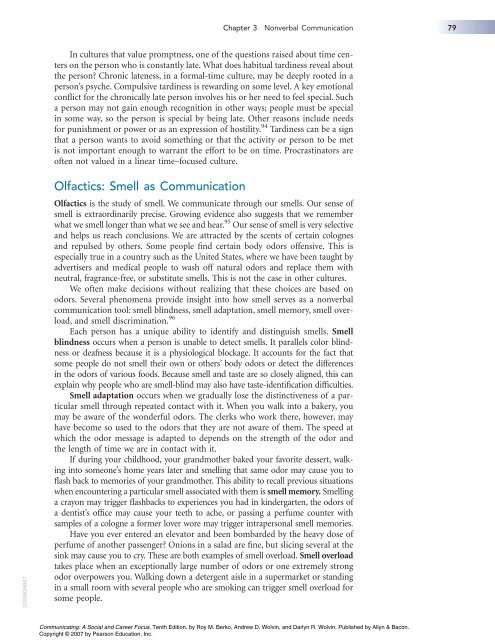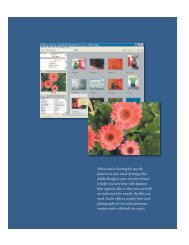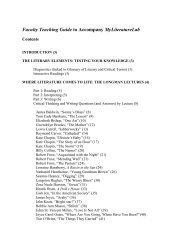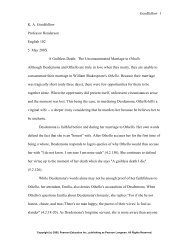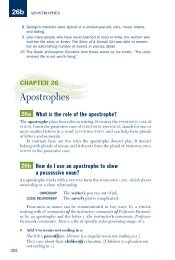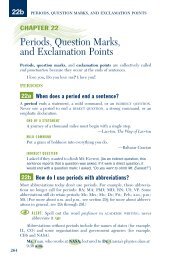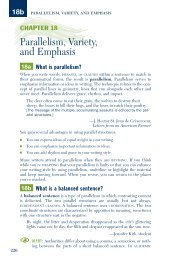chapter 3 - Pearson Learning Solutions
chapter 3 - Pearson Learning Solutions
chapter 3 - Pearson Learning Solutions
You also want an ePaper? Increase the reach of your titles
YUMPU automatically turns print PDFs into web optimized ePapers that Google loves.
2009934667<br />
In cultures that value promptness, one of the questions raised about time centers<br />
on the person who is constantly late. What does habitual tardiness reveal about<br />
the person? Chronic lateness, in a formal-time culture, may be deeply rooted in a<br />
person’s psyche. Compulsive tardiness is rewarding on some level. A key emotional<br />
conflict for the chronically late person involves his or her need to feel special. Such<br />
a person may not gain enough recognition in other ways; people must be special<br />
in some way, so the person is special by being late. Other reasons include needs<br />
for punishment or power or as an expression of hostility. 94 Tardiness can be a sign<br />
that a person wants to avoid something or that the activity or person to be met<br />
is not important enough to warrant the effort to be on time. Procrastinators are<br />
often not valued in a linear time–focused culture.<br />
Olfactics: Smell as Communication<br />
Chapter 3 Nonverbal Communication 79<br />
Olfactics is the study of smell. We communicate through our smells. Our sense of<br />
smell is extraordinarily precise. Growing evidence also suggests that we remember<br />
what we smell longer than what we see and hear. 95 Our sense of smell is very selective<br />
and helps us reach conclusions. We are attracted by the scents of certain colognes<br />
and repulsed by others. Some people find certain body odors offensive. This is<br />
especially true in a country such as the United States, where we have been taught by<br />
advertisers and medical people to wash off natural odors and replace them with<br />
neutral, fragrance-free, or substitute smells. This is not the case in other cultures.<br />
We often make decisions without realizing that these choices are based on<br />
odors. Several phenomena provide insight into how smell serves as a nonverbal<br />
communication tool: smell blindness, smell adaptation, smell memory, smell overload,<br />
and smell discrimination. 96<br />
Each person has a unique ability to identify and distinguish smells. Smell<br />
blindness occurs when a person is unable to detect smells. It parallels color blindness<br />
or deafness because it is a physiological blockage. It accounts for the fact that<br />
some people do not smell their own or others’ body odors or detect the differences<br />
in the odors of various foods. Because smell and taste are so closely aligned, this can<br />
explain why people who are smell-blind may also have taste-identification difficulties.<br />
Smell adaptation occurs when we gradually lose the distinctiveness of a particular<br />
smell through repeated contact with it. When you walk into a bakery, you<br />
may be aware of the wonderful odors. The clerks who work there, however, may<br />
have become so used to the odors that they are not aware of them. The speed at<br />
which the odor message is adapted to depends on the strength of the odor and<br />
the length of time we are in contact with it.<br />
If during your childhood, your grandmother baked your favorite dessert, walking<br />
into someone’s home years later and smelling that same odor may cause you to<br />
flash back to memories of your grandmother. This ability to recall previous situations<br />
when encountering a particular smell associated with them is smell memory. Smelling<br />
a crayon may trigger flashbacks to experiences you had in kindergarten, the odors of<br />
a dentist’s office may cause your teeth to ache, or passing a perfume counter with<br />
samples of a cologne a former lover wore may trigger intrapersonal smell memories.<br />
Have you ever entered an elevator and been bombarded by the heavy dose of<br />
perfume of another passenger? Onions in a salad are fine, but slicing several at the<br />
sink may cause you to cry. These are both examples of smell overload. Smell overload<br />
takes place when an exceptionally large number of odors or one extremely strong<br />
odor overpowers you. Walking down a detergent aisle in a supermarket or standing<br />
in a small room with several people who are smoking can trigger smell overload for<br />
some people.<br />
Communicating: A Social and Career Focus, Tenth Edition, by Roy M. Berko, Andrew D. Wolvin, and Darlyn R. Wolvin. Published by Allyn & Bacon.<br />
Copyright © 2007 by <strong>Pearson</strong> Education, Inc.


